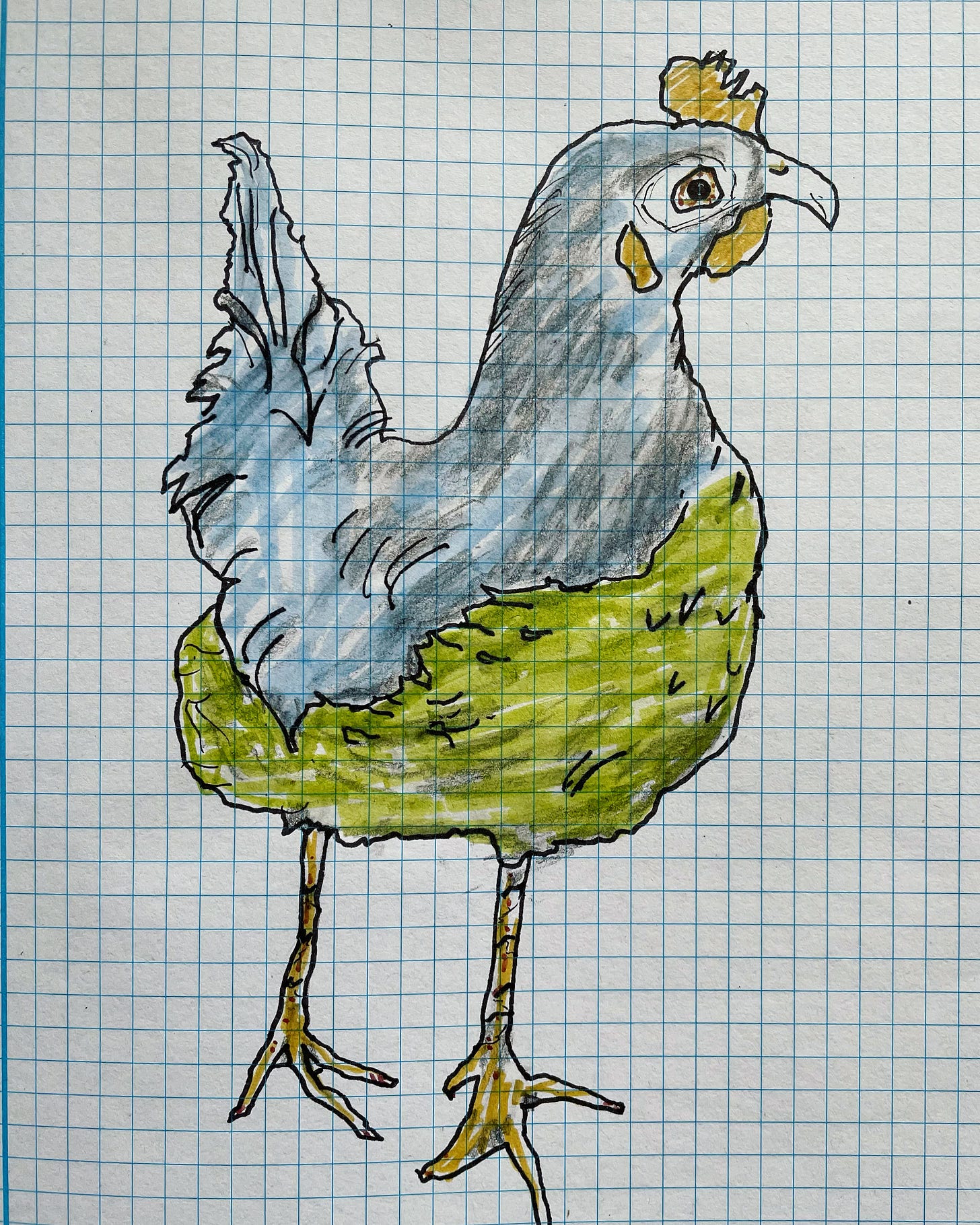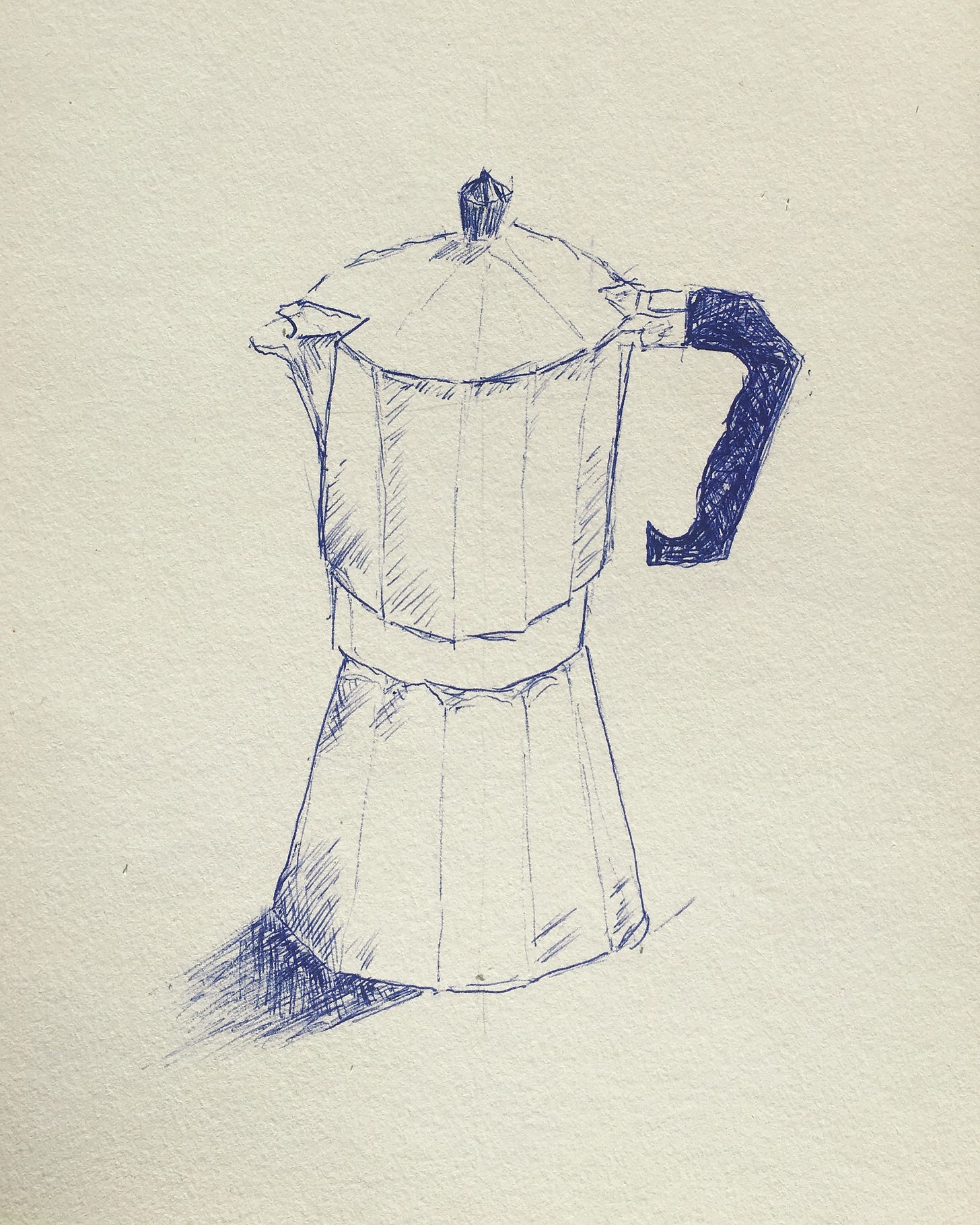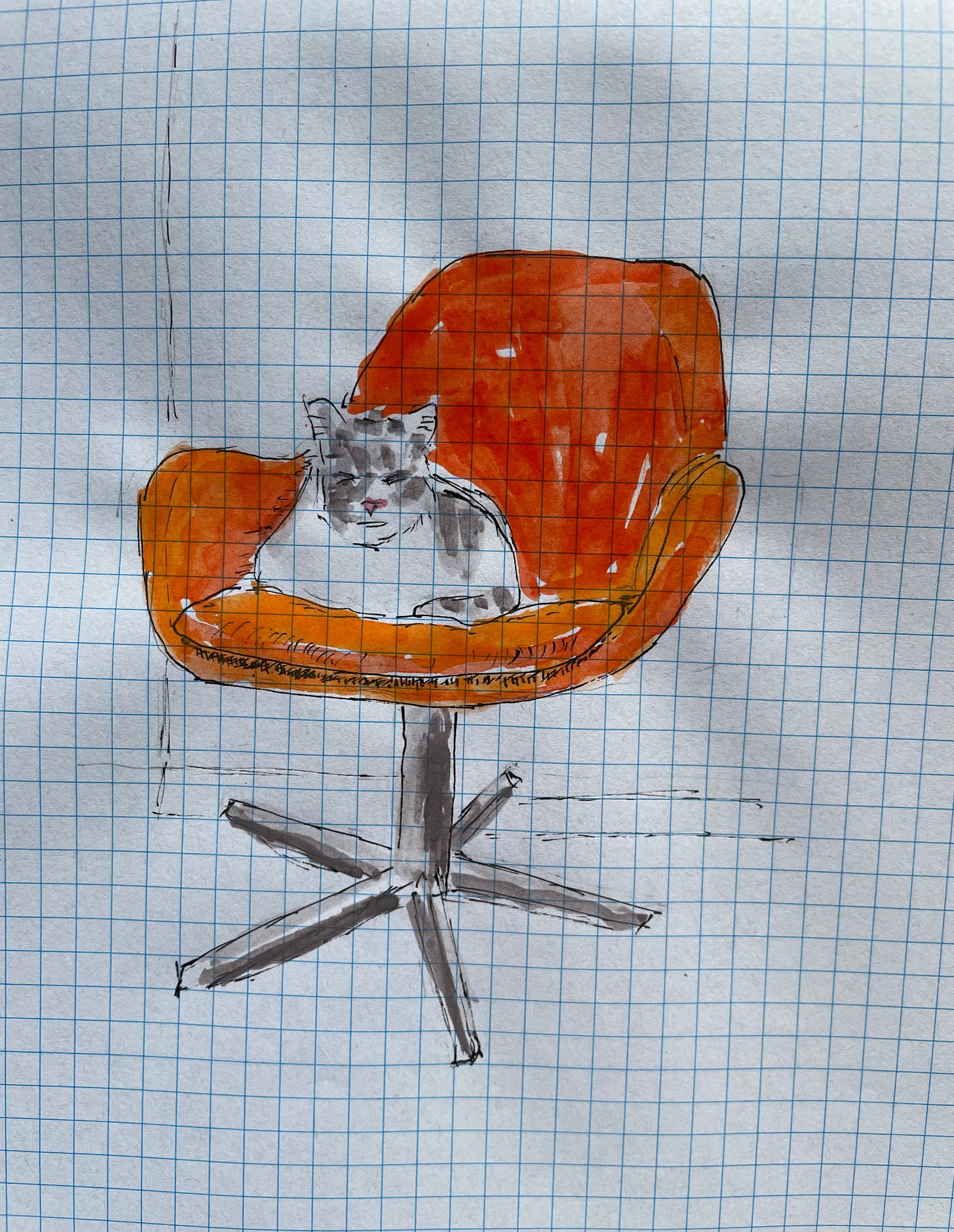Check in
Dear Ones,
As the year winds down, take time to Go Slow Now. Walk in the rain, take home a few colorful leaves, feel gratitude, forgive.
Remember what matters: Spirit, authenticity, justice, words.
Every day: Watch things grow. Live with silence. Reflect.
You drew that?
~What’s it like to have a daily creativity goal?~
I like to think of myself as creative, but I can’t touch Catherine Sanborn. She is an Instagram phenom, posting a new work of art nearly EVERY DAY in a variety of media, from line drawings to watercolor to collage.

A longtime quilter, Catherine started exploring other avenues to creativity even before she retired from University College Cork (in Cork, Ireland), where she was the librarian in charge of technical services
Her first foray into art was stenciling with her artist friend Meredith. Then she did some big works with collage and acrylic but devolved to small pieces because they are so much easier to keep track of—and you don’t have to find a space to hang them.
“I just fell in love with it,” she says of her work. “You don’t have to be an artist to make art. You can just do what you want to do.”
Her inner critic dismissed her earliest attempts at drawing, but eventually it occurred to her that any endeavor will get better with practice.
So when she moved to Ireland in the 1990s, she started quilting and took up the piano. And, following naturally, there was art of another sort.
A podcast can change a life. For Catherine, it was “Creativity Matters” by Amy Cowen. Listening to that podcast, with episodes now numbering in excess of 475, taught Catherine that “creativity matters no matter what activity you do. That just inspired me to start drawing.”
When she retired she thought she’d “quilt my brains out … but I suddenly found I was doing more art.” The sewing room she shares with her wife, singer Anne Bermingham, was rearranged as an art space.
Having a dedicated space helps her to enter the “zone,” a place writers will recognize.
“As a spiritual process, it’s very meditative. I find it hard to sit down to draw because there’s a barrier there … but once I’m in the middle of the process, I’m in the zone, there’s no ‘me’ there anymore. I love the process of being in that place.”
When she finishes a piece, she sets it aside for a day or two, then returns to the work to see the “evolving expression” of it. “When I go back to my drawings there’s something in my gut. … An art friend calls it ‘zones of goodness’.”
She tries to do one drawing a day but doesn’t necessarily post daily (whatever, but she has more than 500 Instagram posts).
Meanwhile, she keeps a visual journal and tries to write and draw every day. That’s where most posts come from.
Like many creatives, she does a drawing exercise—not a long process, maybe 20 minutes—first thing in the morning. Otherwise, “I get very uncentered, very confused in my head.”
The zone is not where you live forever. “You always know that you’ve done enough.”
And that’s Catherine’s art: “It’s just for me, but you know, it’s more about being than doing, than about accomplishing,” she says.
On the other hand, “I still have a lot of quilts I want to make.”
Footnote: In addition to being a wonderful artist, Catherine Sanborn is also my sister. We both liked the surnames of our former spouses, so we kept them. Our “maiden” name was Pollak, difficult for others to both pronounce and spell.
Mangoworld part II
Remember, last week, how we learned to turn a mango inside out? To find all the hidden facets, to carve away all pretense, to find meaning in simple yellow flesh?
Here are some ways I’ve popped open the mango:
Listening: I attend a gathering of friends with a new intention: Before all else, listen. Hear what each person is really saying, letting intuition fill in the gaps between the words. Resist thinking how I will respond, how I will try to mold my own experiences to the conversation. It is not about me; it is about listening with compassion.
Going deeper: I observe, as I always have, the goings-on around me. But now I probe beneath the surface, listening for what the Universe is saying, discovering the metaphors that underlie all existence. Loss, for example: It’s in the leaves that litter the fall sidewalks, in the faces of the widows who share my assisted living, in the sunset that closes a day that can never be recovered.
A memory of loss: When I lived at home, my garden bloomed in mid-April, bluebells rioting in the beds while the last snowdrops hung their heavy heads. Boston ivy fully clothed the 12-foot-tall wall that separated our backyard from the apartments to the east, while the grape leaves were just unfurling.
Our longtime companion, a huge weeping birch, lay in pieces in a neighbor’s yard, rotten in its core yet fresh with sap, crawling with ants. Nobody told the crows, the crows that over the years we watched from our deck as they circled and roosted in that tall tree, swaying with the branches.
Soon, the wall, Shakespearean in its might yet rotting beneath the ivy, would be cut in half, its crumbling concrete carted away, our privacy lost. The tree is gone, the wall diminished. We intuit the inevitability of loss, the impermanence of existence.
Nothing stays the same, nor should it. A new birch replaces the rotten old one. The wall—well, half of it remains, still covered in riotous ivy that stoops to ensnare the raspberry canes below.

Reading: I read more slowly now. The goal isn’t to finish the book, it is to be with the book. Even so, I so often forget what I have read. Slow down, slow down. Sometimes you have to read the same words many times to get their meaning.
Pondering: My way of dealing with all these loses—of friends, of trees, of a wall, of easy reading—is to:
slow down even more,
ponder more deeply,
and let the Universe sort out what I retain.
Prospering: I go more slowly, I accomplish less, I live more. Even as my function decreases, as I walk more slowly and tire more easily, I still feel prosperous.
My involvement with the Universe deepens as I go beneath, teasing out meaning from the simplest tasks and observations.
Each moment brings its glories: a soap bubble escapes from the dishwater to rise and fall, finally disappearing as it kisses the kitchen window. And I, only I, was privileged to witness its brief, happy life and death.
Health: Health is relative. Paradoxically, the weaker I get, the stronger I feel. My legs don’t cooperate, but I work my upper body with seated exercise and a marvelous invention, a seated elliptical called the NuStep. Of course, eating well is the best medicine of all.
Accepting: My power is the power of possibility. The more I accept my reality, the more possibilities open for me.
I create, and I become more creative. I listen with intention, and friends come to me. I lay myself open to the Universe and my blessings multiply. I affirm, and what I affirm comes to pass.
Synchronicities abound, each eliciting the sharp prick of connection. So this is what the world is like. I hold each of them in my palm like a gem.
Forgiving: Accepting, I let go of judgement. This is never easy, but it is essential.
Thanking: I am grateful for all that life brings me, the good and the bad, the edgy and the comfortable. As I live moment by moment, I experience the vast joy of living, the joy that’s folded into every leaf, every feather, every lemon seed or fish scale or spiderweb. How can I be in the world, observing, and not be grateful for all creation?
The hinge: Reading, pondering, prospering, accepting, and forgiving, I turn, turn, turn, like the Shaker dance hymn. Turning, turning, till I come ‘round right.
All this, from a simple mango.
In memoriam
~Betty Balmer was a beloved friend and my children’s piano teacher~
Elisabeth “Betty” Clare Hill Balmer Nov. 27, 1928—March 6, 2019 O, Betty, where did you go? Where did you go? You died in March, with the daffodils... Yesterday was your birthday. How I miss you! All the golden afternoons Over years, my daughters playing for you, with you. Then, Maggie’s last recital. You Who were so fearless about what you called 20th century idiom, Find a challenge for two who had worked together for upwards of a decade. You and she play Milhaud, four hands, two pianos. The duet, “Scaramouche,” after the Renaissance jester, trickster, clown... A difficult piece. A triumph. Triumph as together you sail through the runs, the lulls, the laughter. Then the roaring, the raging, the rising to a frenetic finish. You lift your hands from the keyboards together Yours aged, experienced, strong. Maggie’s young, unlined, yearning. The room explodes, honoring triumph. Woman and woman, you bow together in glory. I can’t recall the music, only its outline, Only the grand pairing of two women who loved each other Loved the music Loved the universe and its maker. That, that Is in my heart today. Mourning? No, not mourning. Celebration.
Footnote: Betty and Don Balmer’s son Tom was Maggie’s mentor. She would later clerk for him at the Oregon Supreme Court. He also married me and Robert in 2004.
Check out
Dear Ones,
I truly hope you are writing, drawing, daydreaming, playing your harmonica—doing something every day that moves you, makes you smile, reaches into your soul. It will change your life. I know this.
Don’t be afraid to create. Don’t put off creating, even if it’s only a bubble-gum bubble. Bake some cookies. Dance with your children. Tell your friends that you love them.
Regret is my least favorite emotion, because regrets are memories of things you can’t undo. One of my regrets is that I did not tell my friends (like Betty Balmer) who are gone now that I loved them. It was a different time. It didn’t occur to me, or to them.
But now when I see my friends, or talk to them, or even email them, I always say, “I love you.” And they say, “I love you, too.”











I do remember Lyza at intel, and I recall she didn’t stay long, but not her catch at our wedding. I also remember she was an excellent writer. Where did she go later? BTW, let’s switch this conversation to email at whmacken@gmail.com
Bill
Fran,
One of my regrets is that I did not tell some of my friends of the difference they made in my life. I've tried to remedy that by writing to some old friends over the past several years. I've written, for example, to several men who enriched my life by readily accepting me, a new student, at their high school. I owe that same appreciation to you. I came to Oregon in 1984, relocating from Washington, D.C., with no job and knowing almost nobody. It was your decision to run some stories I wrote in The Oregonian's Forum section that set me on a new path, that led to thrilling jobs as a reporter at the paper for 10 years and then as Communications Manager at Intel Oregon, the state's largest employer, for 15 years. I have never forgotten your kindness and support. Bless you and I wish you well.
Bill MacKenzie